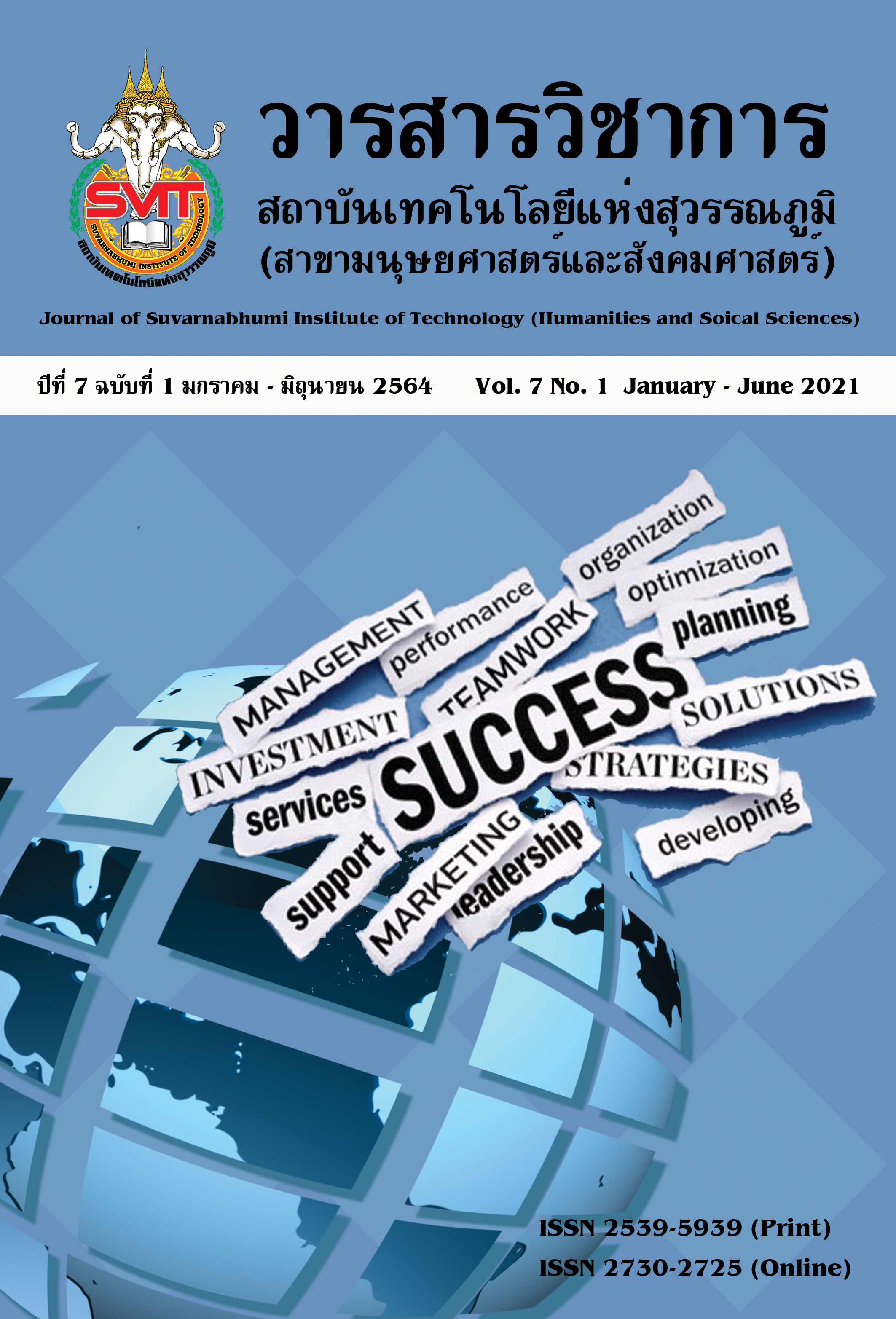A MODEL FOR ORGANIZATION MANAGEMENT OF TELECOMMUNICATION INDUSTRIAL IN THAILAND : A CASE STUDY OF TOT PUBLIC COMPANY LIMITED
Keywords:
Model for Management organization, Skill and Expertise, Telecommunication Industrial TOT Public Company LimitedAbstract
The research had objective to study the factors that are related to the A Model for Management organization of industrial Telecommunication in Thailand (A Case Study: TOT Public Company Limited). The study was a mixed method research using both quantitative and qualitative methodologies. For quantitative research, the researcher used a Purposive Selection sampling, and the data were collected from 450 samples which were employees in TOT Public Company Limited. The instrument for data collection was Likert scale questionnaire whose Index of item objective congruence (IOC) equaled 0.91 and Cronbach’s Alpha Coefficient equaled 0.88. And for qualitative research, the researcher used purposive sampling by using in-depth interview with 13 people of Executive Primary Level for 3 companies in leader of industrial Telecommunication in Thailand. The findings were as follows:
The researcher for quantitative research founding
For were sixed Factors including 1) Employee Engagement 2) Sustainability expertise 3) Financial skills and expertise Accounting 4) Strategic skills and expertise 5) Control skills and expertise 6) Innovation skills and expertise were found that all factors have a relationship with a success factors (growth) in the overview by multiple correlation coefficient, is 0.687 and can be forecasts on the key success factors (growth) 0.473 in level significantly is 0.05 and having a standard of estimate is 0.247 and the factors have highest to influencing for the key success is Employee Engagement with Organization, because of have the most valuable is Beta 0.483
The researcher for qualitative research found
Factors related to the organizational management model of the telecommuni- cations industry in Thailand from the management's perspective. There are 3 factors: 1) Control skills and expertise 2) Sustainability expertise 3) Employee Engagement. Because of these 3 factors are factors that affect to the performance of the organization's outstanding expertise. It is a key factor in driving the strategy of the organization, being the leader in telecommunication services. In addition, The key success (Business growth) for the researcher has found from aspect from Executive Primary Level for 3 companies, including increased revenue, market share And corporate image. The 3 factors that show the real performance of the organization. And make the society see that the organization has been successful in the telecommunication industry market.
References
ทีโอที จำกัด (มหาชน). (2559). รายงานประจำปี 2559. บริษัททีโอที จำกัด (มหาชน), น.1-220. จากhttps://www.tot.co.th
ทีโอที จำกัด (มหาชน). (2560). รายงานการพัฒนาความยั่งยืน (SR Report) ประจำปี 2560, น.1-95. จาก https://www.tot.co.th
แอดวานซ์ อินโฟร์ เซอร์วิส จำกัด (มหาชน), (2562). รายงานประจำ ปี 2562. จาก https://investor.ais.co.th/misc/ar/20200228-advanc-ar2019-th.pdf
Apichat. (2016). Internet of Things (IoT) คืออะไร. จาก http://www.mcuthailand.com/articles/iot/IOT.html
Abdullah Hussein Al-Hashedi, & Sanad Ahmed Abkar. (2017). The Impact of Service Quality Dimensions on Customer Satisfaction in Telecom Mobile Companies in Yemen. American Journal of Economics, 7(4), 186-193.
Deloitte. (2017). TelecommunicationsIndustry Outlook 2017. form https://www2.deloitte.com/us/en/pages/technology-media-and-telecommunications/articles/telecommunica tions-industry-outlook.html.
Didia J. U. D., & N. Gladson Nwokah. (2015). Sales Integration and Business Performance in the
Telecommunication Industry in Nigeria. Journal of Marketing and Consumer Research www.iiste.org ISSN 2422-8451. An International Peer-reviewed Journal, 11, 1-12.
Elvira Tabaku & Shpëtim Çerri. (2015). An Empirical Investigation of Customer Loyalty in Telecommunication Industry in Albania. Mediterranean Journal of Social Sciences MCSER Publishing, Rome-Italy, 6(1).
Gould, A. M., & Desjardins, G. (2015). A spring-clean of Michael Porter’s Attic: The Canadian telecommunications sector as an exemplar of refurbished generic strategy. Competitiveness Review, 25(3), 310-323.
Ladislave Mozny. (2017). Key Elements of strategy in the telecommunication industry – Overview of discussion. Business Trends, 7(3), 60-71.
María del Mar Alonso-Almeida, Josep Llach, and Frederic Marimon, (2014). A Closer Look at the Global Reporting Initiative Sustainability Reporting as a Tool to Implement Environmental and Social Policies: A WorldwideSector Analysis, Corporate Social Responsibility and Environmental ManagementCorp. Soc. Responsib. Environ. Mgmt. 21, 318–335 (2014) Published online 11 July 2013 in Wiley Online Library, (wileyonline library.com) DOI: 10.1002/csr.1318
McMillan Thomas T. (1971). The Delphi Technique. paper presented at annual meeting of California Junior. College Association Commission on Research and Development (3 May 1971). Monterre: California.
Muhammad Ehsan Malik. (2012). Impact of Brand Image, Service Quality and price on customer satisfaction in Pakistan Telecommunication sector. International Journal of Business and Social Science, 3(23), 1-7.
Muneer Zuhdi. (2012). Strategic Management in the Telecom Industry to Create Competitive
Advantage, Universidade de Aveiro 2012, Departamento de Economia, Gestao Engenharia Industrial pp.1-340.
Taipaleenmaki & Ikaheimo.(2013). On the convergence of management accounting and financial accounting–the role of information technology in accounting change. International Journal of Accounting Information Systems, 14(4), 321-348.
Seyedeh Khadijeh Taghizadeh et al. (2013).Service Innovation Management on Market Performance through Relevancy of Market conditions: Guide to Telecommunications
Industr. Malaysia.
Verma MD & Nayak Sarita.(2014).Employee Retention through Employee Engagement: Observation from Telecom Sector. International Journal of Advances in Management and Economics, 3(4), 189-196. Retrieved from www.Manage mentjournal.info
Yamane, T. (1976). Statistics: An Introductory Analysis (3rd Ed). New York: Harper and Row Publications.
Zattoni, A. and Cuomo, F. (2010). How independent, competent and incentivized should non-
executive directors be?: An empirical investigation of good governance codes. British Journal of Management, 21(1), 63–79.
Zafar Gul (2015). Impact of Employee Commitment on Organizational Development. FWU Journal of Social Sciences, Winter 2015, 9(2), 117-124.
Zur Erlangung des Doktorgrades. (2013). Factors for Revenues and Market Share Growth in the Mobile Telecommunications Industry. Dissertation: Universitat Ulm.
Downloads
Published
Issue
Section
License
The articles published are copyrighted by the Sarasas Journal of Humanities and Social Science. The opinions expressed in each article in this academic journal are those of the individual authors and do not reflect the views of Sarasas Suvarnabhumi Institute of Technology. The authors are solely responsible for all aspects of their respective articles. Any errors or inaccuracies in the articles are the sole responsibility of the authors.



